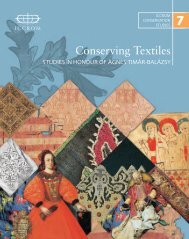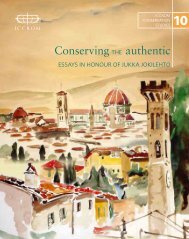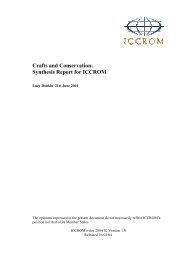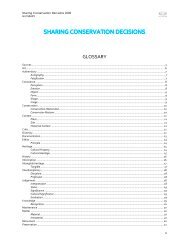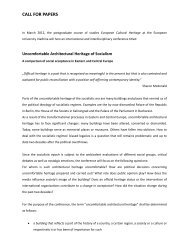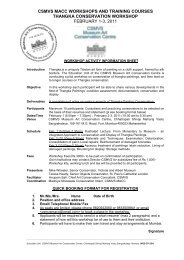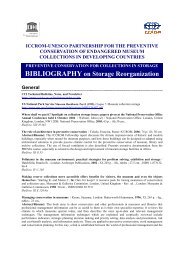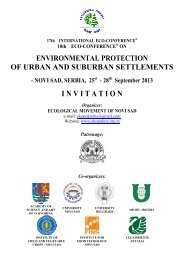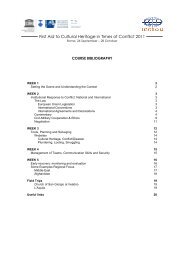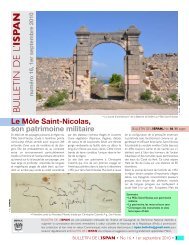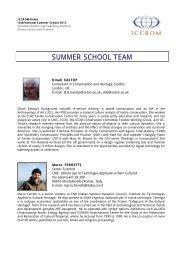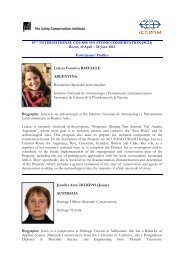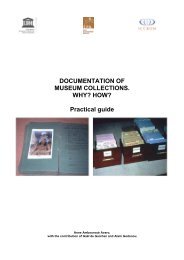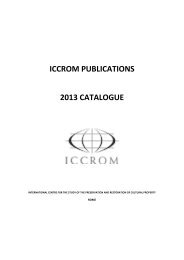Annual Report 2011 - Iccrom
Annual Report 2011 - Iccrom
Annual Report 2011 - Iccrom
Create successful ePaper yourself
Turn your PDF publications into a flip-book with our unique Google optimized e-Paper software.
Training: regional activities<br />
Regional programmes at<br />
ICCROM have evolved as<br />
a means of complementing<br />
the training activities that take<br />
place at the international<br />
level. Regional activities are<br />
able to focus on cultural<br />
practices, materials, and<br />
problems common to<br />
specific geographical areas.<br />
However, they are a more<br />
fragile part of ICCROM’s<br />
overall programme because<br />
they rely almost entirely on<br />
extra-budgetary support for<br />
their implementation. Given<br />
the current economic context,<br />
it has become increasingly<br />
difficult to access the<br />
necessary funds to support<br />
regional training activities.<br />
During <strong>2011</strong> ICCROM has continued to<br />
carry out its regional programmes through<br />
collaboration with other institutions and<br />
governments. In the Arab States, the<br />
ATHAR programme has benefited from a<br />
strong partnership with the Government<br />
of Sharjah, United Arab Emirates. Ongoing<br />
collaboration in the MOSAIKON initiative<br />
was made possible through partnerships<br />
with the Getty Conservation Institute<br />
(GCI), the Getty Foundation, and the<br />
International Committee of Conservation of<br />
Mosaics (ICCM). The LATAM programme<br />
continued implementing activities in<br />
<strong>2011</strong> with a seminar on Measuring<br />
Heritage Conservation Performance,<br />
held in Recife, Brazil in partnership with<br />
the Centro de Estudos Avançados da<br />
Conservação Integrada (CECI). Future<br />
activities are planned with support from<br />
the governments of Mexico and Spain. In<br />
Asia, the CollAsia programme has now<br />
reached its conclusion. Two final courses<br />
on the Conservation of Collections and<br />
Intangible Heritage, and on Managing Risk<br />
from Climate Change, were held in March<br />
and May <strong>2011</strong> respectively. A concluding<br />
seminar was also carried out in August to<br />
discuss ways to build on the success of<br />
the programme for future activities in the<br />
region.<br />
Activities within our regional programmes<br />
from November 2010 to October <strong>2011</strong><br />
included three courses, with a total of<br />
seven weeks of learning. Forty-three<br />
participants took part in these courses.<br />
There were an additional four seminars<br />
carried out as part of regional programmes<br />
during this period.<br />
ATHAR<br />
Conserving cultural heritage<br />
in the Arab region<br />
Entering into its final phase this year, the<br />
ATHAR programme continues its goal of<br />
protecting and promoting the rich cultural<br />
heritage of the Arab region. ICCROM and<br />
the United Arab Emirates entered into an<br />
agreement on 28 March <strong>2011</strong> to establish<br />
a regional training and development centre<br />
in Sharjah. His Highness Dr Sheikh Sultan<br />
bin Mohammed Al Qasimi, Member of the<br />
Supreme Council and Ruler of Sharjah,<br />
UAE, and the Director-General of ICCROM<br />
signed this agreement, which also extends<br />
Sheikh Sultan’s support for the ATHAR<br />
programme to the end of 2014.<br />
This past spring ATHAR organized a<br />
regional course on the Conservation of<br />
Organic Materials in Heritage Sites and<br />
Collections, which took place in three<br />
phases. The first phase consisted of an<br />
intensive workshop from 26 April to 16<br />
May <strong>2011</strong>, organized through ICCROM’s<br />
recently established regional centre in<br />
Sharjah. The aim of the workshop was<br />
to train conservation professionals in<br />
the conservation of organic materials —<br />
including wood and timber constructions,<br />
paper, manuscripts, and textiles — found<br />
in built heritage and museum collections.<br />
Following the first phase, participants<br />
carried out projects in their own<br />
workplaces, producing reports with the<br />
continued help of the course instructors.<br />
The course concludes with a review<br />
meeting in the last week of October.<br />
ICCROM Newsletter 37: <strong>Annual</strong> <strong>Report</strong> 15



